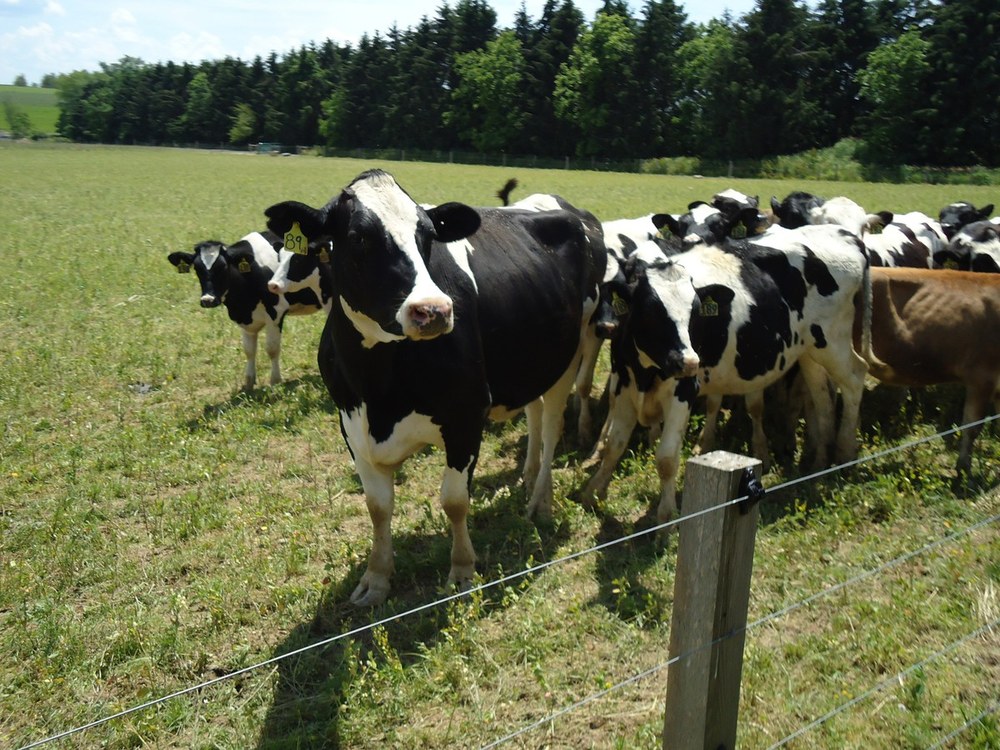Incorporating Livestock at the Rodale Institute

Livestock Comes to Rodale
For over thirty years, the Rodale Institute has been known for expertise and research projects on organic vegetable and field crop agriculture. However, this year has seen the incorporation of several livestock projects at Rodale. During PA WAgN's 2012 tour of Rodale, we learned about the institute's endeavors in dairy, chicken, pigs, and honeybees.
Dairy
We had the pleasure of visiting James Burkholder on his neighboring farm. Mr. Burkholder ran a conventional dairy operation until last year when he and Rodale formed a collaboration. Rodale helped Burkholder transition his dairy to organic by converting 150 acres of Rodale land to pasture for the cows. Usually, it takes three years to transition to organic--three years to transition the land and one year to transition the animals. However, Burkholder was able to transition in just one year because he had access to certified organic land from the start. They just sold their first truck of milk to Organic Valley in April 2012.
Burkholder explained that he originally became interested in transitioning to organic for the financial benefits but soon began to see that organic farming is more than just money. He said he liked the "back to basics" nature of organic farming. He explained, "It's not rocket science, it's just good." Burkholder said that the cows were like kids in a candy shop when they were first let out to graze. Since transitioning the cows to organic pasture, Burkholder says that his milk production has decreased somewhat but that his bottom line has improved overall thanks to fewer vet bills and the ability to sell cows rather than having to acquire more.
Rodale's Jeff Moyer explained that Rodale benefits from the collaboration, too. They have access to recently conventional land for testing, access to the milking parlor, and new products for nutritional analysis.
Poultry and Pigs
Two other livestock projects that started this year at Rodale are raising heritage breed chickens and pigs. The plan for the chickens is to conduct a cost analysis to determine what a real organic egg costs. Coach Mark Smallwood, Rodale's executive director, explained that this information will be useful to farmers for determining how to price their eggs and also for education consumers on the true cost of egg production.

Pigs are also new arrivals on the farm. We saw Large Blacks, a heritage breed. These pigs do not root like many conventional hogs. Instead, they graze, and farmers are able to keep them on a rotation without harming the pasture. Read more about Rodale's pigs and how you can sponsor them:
http://www.rodaleinstitute.org/store/products/Farm_Sponsorships/Sponsor_A_Pig.html
Honeybees
The final new addition to Rodale is the tiniest but also the most abundant. Partnering with Baltimore Honey, Rodale created a stewardship program for people in urban areas where hives are not allowed. Instead, they house their honeybees at Rodale. The honeybees build their hives in the innovative Thomas Hybrid Hive, a combination of traditional hives for the ease of the beekeepers and a more natural design that allows bees to form the honeycomb in the natural heart-shaped pattern.
For more information on the Honeybee Conservancy, visit: http://www.rodaleinstitute.org/honeybee-conservancy
Pennsylvania Women's Agricultural Network
Address
302 Armsby BuildingUniversity Park, PA 16802
- Email pawagn@psu.edu
Pennsylvania Women's Agricultural Network
Address
302 Armsby BuildingUniversity Park, PA 16802
- Email pawagn@psu.edu


